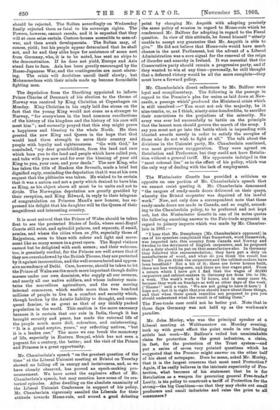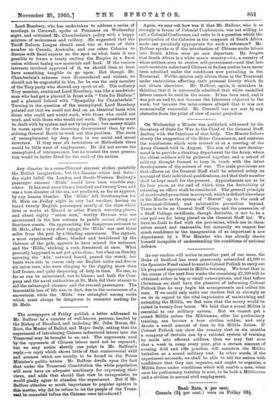The deputation from the Storthing appointed to inform Prince Charles
of Denmark of his election to the throne of Norway was received by King Christian at Copenhagen on Monday. King Christian in his reply laid due stress on the fact that the young King would not come as a stranger to Norway, "for everywhere in the land common recollections of the history of the kingdom and the history of his race will meet him"; and earnestly prayed that this step might prove a happiness and blessing to the whole North. He then greeted the new King and Queen in the hope that God would lend them strength to serve their country and people with loyalty and righteousness. "Go with God," he concluded, "my dear grandchildren, from the land and race which bore you to the land and people which have called you, and take with you now and for ever the blessing of your old King to you, your race, and your deeds." The new King, who has taken the title of Haakon the Seventh, made a brief but dignified reply, reminding the deputation that it was at his own request that the plebiscite was taken. He wished to be certain that it was a nation and not a party which desired to have him as King, as his object above all must be to unite and not to divide. The Norwegian deputation are greatly gratified by their reception, and King Edward, in reply to their telegram of congratulation on Princess Maud's new honour, has ex- pressed his delight that his daughter will be the Queen of their magnificent and interesting country.
It is most natural that the Prince of Wales should be taken first to see the protected States of India, where semi-Royal Courts still exist, and splendid palaces, and separate, if small, armies, and where the cities when en, file, especially those of Rajputana, seem to blaze with colour and light and move- ment like so many scenes in a great opera. The Royal visitors cannot but be delighted with such scenes ; and their welcome, too, is genuinely cordial, for the Princes are well aware that if they are overshadowed by the British Throne, they are protected by it against insurrection, and the well-remembered and oppres- sive ascendency of Delhi. Care, however, should be taken to let the Prince of Wales see the much more important though duller masses under our own dominion, who supply all our revenue, and nearly all our native soldiers, and whose industry main- tains the marvellous agriculture, and the ever moving internal commerce, which enable more than two hundred millions of people to live in a comfort and security which, though broken by the Asiatic liability to drought, and conse- quent famine, is as great as that of any thickly packed population in the world. This caution is the more necessary because it is certain that our rule in India, though it has brought security and peace, has made the external life of the people much more dull, colourless, and uninteresting. "It is a grand sceptre, yours," say reflecting natives, "but it is a leaden one." The more we can break the monotony of life, especially in Eastern Bengal, which has not seen a pageant for a century, the better; and the visit of the Prince and Princess is a great opportunity.
Mr. Chamberlain's speech "on the greatest question of the time" at the Liberal Unionist meeting at Bristol on Tuesday showed no falling off in energy and incisiveness, and, as we have already observed, has proved an epoch-making pro- nouncement. We have noted the explosive effect of Mr. Chamberlain's speech, but may mention here some of its ora- torical episodes. After dwelling on the absolute unanimity of the Liberal Unionist Conference in support of his policy, Mr. Chamberlain vigorously assailed the Liberals for their attitude towards Home-rule, and scored a good debating paradise. point by charging Mr. Asquith with adopting precisely the same policy of evasion in regard to Home-rule which be condemned Mr. Balfour for adopting in regard to the Fiscal question. In view of this attitude, he found himself "utterly unable to accept any guarantee that Mr. Asquith is able to give." He did not believe that Home-rule would have much chance in the next Parliament, but the advent of a Liberal Administration was a sure signal for the renewal of the reign of disorder and anarchy in Ireland. It was essential that the Conservative party should remain a progressive party, and if they wanted to win at any time—personally, he still thought that a deferred victory would be all the more complete—they must have a forward policy.
Mr. Chamberlain's direct references to Mr. Balfour were loyal and complimentary. The following is the passage in regard to the Premier's plea for union as laid down at New- castle, a passage which produced the Ministeral crisis which is still unsolved :—" You must not ask the majority, be it nine-tenths, or, as I think, ninety-nine-hundredths, to sacrifice their convictions to the prejudices of the minority. No army was ever led successfully to battle on the principle that the lamest man should govern the march of the army. I say you must not go into the battle which is impending with blunted swords merely in order to satisfy the scruples of those who do not wish to fight at all." The talk about the divisions in the Unionist party, Mr. Chamberlain continued, was most grotesque exaggeration. They were agreed on Retaliation and Preference, but they could not have Retalia- tion without a general tariff. His opponents indulged in the "most colossal lies" as to the effect of his policy, which was the only way of dealing with the lack of employment.
The Westminster Gazette has provided a criticism so apposite on one portion of Mr. Chamberlain's speech that we cannot resist quoting it. Mr. Chamberlain denounced "the cargoes of ready-made doors delivered on their quays, whereby the Bristol carpenter was deprived of his lawful work." Now, not only does a correspondent note that these ready-made doors are made in Canada, and so ought, accord- ing to the Chamberlain policy, to be preferred and not kept out, but the Westminster Gazette in one of its notes quotes the following smashing answer to the Fair-trade argument in regard to joinery imports which was made by Mr. Chamber- lain in 1885 :—
"I hear that Mr. Dumphreys [Mr. Chamberlain's opponent] in one of his speeches complained that framework, wood framework, was imported into this country from Canada and Norway and Sweden to the detriment of English carpenters, and he proposed that a duty should be put on that manufacture also. In Germany they followed this recommendation ; they have put a duty on manufactures of wood, and what do you think the result has been ? Do you think the carpenters and the cabinet-makers have been benefited ? Not a bit of it ; there are fewer houses built, there are less working-men, and there are less wages paid. From a return which I have got I find that the wages of 30,000 carpenters and cabinet-makers in Germany are from 18s. to 19s. a week. The week's work is 72 hours, and in many cases 84, because they work on Sundays as well as other days of the week. (` Shame !' said a voice. We are not going to have it here.') I hope not ; but it is right that you should know about these things, and that when these quack remedies are proposed to you you should understand what the result is of taking them."
The Free-trade case could not be better put. Note that in those days Germany was not held up as the workman's
Mr. John Morley, who was the principal speaker at a Liberal meeting at Walthamstow on Monday evening, took up with great effect the point made in our leading article last week—Mr. Balfour's veiled but unmistakable claim for protection for the great industries, a claim, in fact, for the protection of the Trust system—and put a series of seven very pointed questions which he suggested that the Premier might answer on the other half of his sheet of notepaper. Does he mean, asked Mr. Morley, that it is the largest concerns that most need Protection ? Again, if he really believes in the intrinsic superiority of Pro- tection, what becomes of his statement that he is for Retaliation as a weapon for procuring general Free-trade ? Lastly, is his policy to construct a tariff of Protection for the strong—the big Combines—so that they may choke out small producers and small industries and raise the price to all consumers I' Lord Rosebery, who has undertaken to address a series of meetings in Cornwall, spoke at Penzance on Wednesday night, and criticised Mr. Chamberlain's policy with a happy mixture of seriousness and raillery. He suggested that the Tariff Reform League should send two or three of their number to Canada, Australia, and our other Colonies to discuss with fiscal experts on the spot on what basis it was possible to frame a treaty uniting the Empire in a fiscal union without taxing raw materials and food. If the various interests involved approved of it, we should then at least have something tangible to go upon. But though Mr. Chamberlain's schemes were ill-considered and violent, we should not be ungrateful to him, for he was the only member of the Tory party who showed any sport at all. The ordinary Tory member, continued Lord Rosebeiy, was like a sandwich. man who had got a placard in front with "Vote for Balfour" and a placard behind with "Sympathy for Chamberlain." Turning to the question of the unemployed, Lord Rosebery pointed out that we could not deal, on an identical basis with those who could and would work, with those who could not work, and with those who would not work. The question must be dealt with by system and not by impulse ; but money might be worse spent by the incoming Government than by sub- sidising General Booth to work out this problem. The roots of unemployment lay deep down in our social and moral structure. If they were all teetotalers or Methodists there would be little want of employment. He did not accuse the unemployed of intemperance, but be trusted the next genera- tion would be better fitted for the work of the nation.





















































 Previous page
Previous page